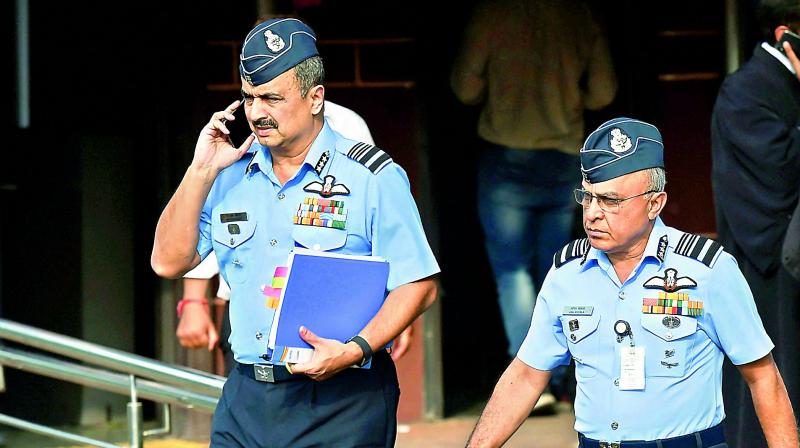Centre adamant on price non-disclosure
Court reserves its order on pleas seeking investigation.

New Delhi: The Supreme Court said pricing details of Rafale jets could only be discussed after it decides on whether to make it public, and reserved its order Wednesday on pleas seeking a court-monitored probe into the multi-billion deal amid the government’s vehement opposition to any public disclosure.
“The decision we need to take is whether to bring the facts on pricing into the public domain or not,” said the bench, which also comprised Justices S.K. Kaul and K.M. Joseph.
Vehemently defending non-disclosure of the price publicly, attorney-general K.K. Venugopal said the cost of a bare Rafale jet as per the 2016 exchange rate was '670 crore and the disclosure of price of a “fully loaded” aircraft would give an “advantage to adversaries”. He said: “If the cost of a fully-loaded aircraft with weaponry and avionics is disclosed, our adversaries would be able to know what is the nature of avionics and weapons fitted in it.” Mr Venugopal added that India cannot go back on an agreement with France to disclose confidential information about the specifics on avionics and weaponry.
Countering the petitioners' argument that Parliament had been given the pricing twice, Mr Venugopal said: “We have been saying that even Parliament has not been told about the complete cost of the jets.”
Petitioner lawyer Prashant Bhushan claimed the Union law ministry had red-flagged two issues – absence of a sovereign guarantee by France and an international arbitration clause under which the arbitration seat would be in Geneva – but the government had gone ahead with the deal.
Mr Venugopal admitted that there was no sovereign guarantee, but said that France had given a “letter of comfort” which was as good as a governmental guarantee. He also said issues like types of aircraft and weapons needed to be bought cannot be adjudicated by a court as these were the matters to be decided by experts.
In the four-hour hearing, the bench told Mr Venugopal that the court would want to interact with the Indian Air Force officers instead of defence ministry officials to know about the requirements of the IAF. "We are dealing with the requirements of the Air Force and would like to ask an Air Force officer about their requirements. We want to hear from an Air force officer and not the official of the defence ministry on the issue," the bench said after the A-G informed it that an additional secretary of the defence ministry was present in the court.
Later, a senior IAF official, Air Vice-Marshal J. Chalapati, alongwith other top officers including Air Marshal Anil Khosla and the deputy chief of air staff, Air Marshal V.R. Chaudhari, appeared in the court and the CJI interacted with Air Vice-Marshal Chalapati on the requirements of the IAF.
During the hearing, Justice Joseph referred to the 2007 Request for Proposal (RFP) for procurement of 126 Rafale jets and observed: "The RFP was scrapped in June 2015. Then how can you (government) claim that the due process laid down earlier was followed?"
The CJI also asked Mr Venugopal: "Is the fresh RFP required in an inter-governmental agreement for the 36 jets?". To this, he said an IGA does not require a fresh RFP.
The court then asked whether the new 36 jets were same as the bare planes which were sought to be procured in 2007. "Yes", said Mr Venugopal, and added that the "deliverables" were much better this time due to the time gap and improvement in technology.
He also said that even in 2007, the pricing of weaponry and avionics were not made public as claimed by the petitioners. On the offset partner issue, the bench asked the additional secretary of the defence ministry: "What happens to the country's interests if the Indian offset partner chosen is not good enough and not able to make good the contract? What was the need to amend offset guidelines with retrospective effect?"
Responding to the query, the official said if the selection of offset partner was not valid, Dassault would run the risk of the government not accepting its decision on the offset partner and a penalty can also be imposed.
Mr Bhushan, appearing on behalf of himself and former Union ministers Yashwant Sinha and Arun Shourie, alleged that the government was "hiding" behind the secrecy clause.

